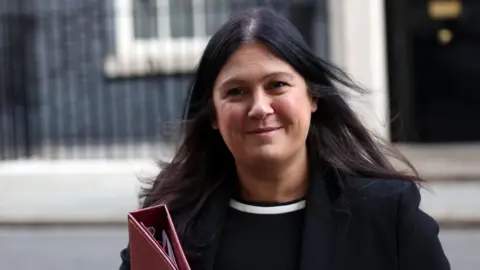In a recent development, the current culture secretary of the United Kingdom, Lisa Nandy, has publicly stated that the BBC’s licence fee is “unenforceable.” This remark comes as the government prepares to conduct a comprehensive review of the funding model that supports the BBC later this year. As discussions surrounding the future of the British Broadcasting Corporation continue, Nandy emphasized that the government is open to exploring all possible options regarding the licence fee, which is currently set at £174.50 annually.
During an interview with the Telegraph, Nandy articulated concern over the declining number of individuals opting to pay the licence fee. She highlighted that there are “fewer and fewer people” fulfilling this financial obligation, raising questions about the sustainability of the current funding structure. The licence fee is a critical aspect of the BBC’s financial foundation, contributing approximately two-thirds of its total income in the previous financial year, equating to £3.7 billion.
The licence fee’s legitimacy and enforcement are primarily rooted in the BBC’s Charter Agreement, which is set to expire in 2027 and is hereunder review. This charter establishes the operational terms and conditions of the BBC, inclusive of the existence of the licence fee that funds its programming. A representative from the BBC expressed eagerness to engage with the government throughout this process to ensure the corporation’s long-term viability.
As the negotiations initiated by Nandy with the BBC gain momentum, she observed that the government is actively committed to reshaping the funding framework. “We’re open to a different system,” she noted, while also pointing out that no definitive models have been proposed. Moreover, Nandy expressed a desire for public involvement in crafting a more equitable and sustainable funding model.
Statistics provided by the BBC indicate that currently, around 80% of households are paying the licence fee. However, Nandy has raised specific concerns about how the fee’s enforcement has historically impacted particular demographics. She referred to findings that showed a disproportionate targeting of women, stemming from societal dynamics where women are more likely to live alone or be home when licensing officers come to check compliance.
Previous reviews conducted by the BBC have documented these gender disparities in licence fee prosecutions. A review from 2017 underscored that households headed by women were more frequently subject to scrutiny, with women also being more likely to engage positively with enforcement officers. Compounding the matter, it was reported that women accounted for a staggering 76% of the 52,376 individuals charged with licence fee violations in 2020. In response to these concerns, the BBC recently committed to revising its approach to ensure a more equitable enforcement mechanism.
Nandy openly criticized the current fee structure, describing it as “deeply regressive”. She is reportedly considering a range of innovative solutions to rectify the funding system, although she has dismissed the idea of utilizing general taxation to finance the BBC. Nonetheless, she remains receptive to the potential for a subscription-based model that could adapt to the expectations of modern media consumers.
In a separate commentary, the chairman of the BBC hinted at the possibility of adjusting the licence fee based on household wealth, suggesting that affluent homes might be charged a higher rate. This notion aligns with a broader conversation about the relevance and fairness of the BBC’s funding in the face of changing societal norms and technological advancements.
In summary, the dialogue surrounding the BBC’s licence fee reflects a critical juncture for the institution, grappling with challenges of enforcement, demographic disparities, and changing public sentiment. As the government moves towards a renewed charter agreement, Nandy’s commitment to public engagement in shaping a more sustainable and equitable model represents a significant shift in policy-making. The overall objective remains clear: to secure the future of the BBC while addressing underlying issues in its current funding system.



